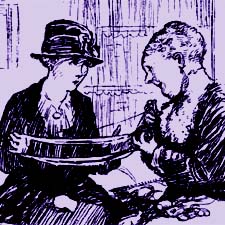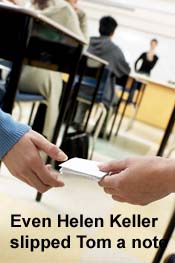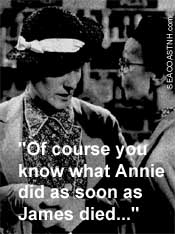| Gossip About Portsmouth Writers |

Here’s a lost classic for people who truly love the backstory. Writers were the rock stars of the later 19th century. CA Hazlett, a Portsmouth librarian, went behind the scenes in 1915 to tell personal tales about Thaxter, Aldrich, Fields, Shillabre, Jewett, Foss and many others. Think of it as E! entertainment gossip from back in the days when people actually read books.
SEE ALSO our Poetry and Famous People scetions
Reminiscences of Portsmouth Authors
By C. A. Hazlett
From Granite Monthly, March 1915
For nearly a century it has been my privilege to know the majority of authors who were natives or residents of the "Old Town by the Sea." This title was selected by Thomas Bailey Aldrich in 1874 for a contribution to Harper’s Monthly and in 1883 it was published with additions in book form. The list of Portsmouth poets is a long one, for in 1864 my high school master, Aurin M. Payson, in connection with the poet, Albert Laighton, compiled and issued the "Poets of Portsmouth." Forty natives of Portsmouth were considered worthy of having their verses inserted. Alphabetically the book included Aldrich, Brewster, Fields, Kimball, Laighton and Shillaber, all of whom I knew and will mention unpublished incidents concerning them, and also of the later authors Albee, Foss, Hackett and Thaxter.
 Concerning Thomas Bailey Aldrich, there is sufficient material to cover many pages. It was mainly in his later years that I knew and had correspondence with him while he was living in New York and Boston. Aldrich spent his summers in Portsmouth in the ‘50s and ‘60s. In 1868 he was giving all his spare time here in writing the story of "The Bad Boy" which had and still has a great sale and has been translated into several foreign languages. When traveling in Russia, Aldrich noticed a small boy engrossed in a book and asking his guide to ascertain the title was told it was a translation of a "Story of a Bad Boy." The book made Rivermouth and Portsmouth famous. It had many local allusions, in nearly all of which he was an active participant; the stage-coach incident, however, being an exception, for the ex-mayor William H. Sise told me that Aldrich was not one of the bad boys who burned the coach. Mayor Sise each year observed the third of July by ordering and eating ice cream in the same shop where he and others celebrated the burning of the coach.
Concerning Thomas Bailey Aldrich, there is sufficient material to cover many pages. It was mainly in his later years that I knew and had correspondence with him while he was living in New York and Boston. Aldrich spent his summers in Portsmouth in the ‘50s and ‘60s. In 1868 he was giving all his spare time here in writing the story of "The Bad Boy" which had and still has a great sale and has been translated into several foreign languages. When traveling in Russia, Aldrich noticed a small boy engrossed in a book and asking his guide to ascertain the title was told it was a translation of a "Story of a Bad Boy." The book made Rivermouth and Portsmouth famous. It had many local allusions, in nearly all of which he was an active participant; the stage-coach incident, however, being an exception, for the ex-mayor William H. Sise told me that Aldrich was not one of the bad boys who burned the coach. Mayor Sise each year observed the third of July by ordering and eating ice cream in the same shop where he and others celebrated the burning of the coach.
I find in the Portsmouth Journal of October 28, 1854, that the editor, C. W. Brewster, in his review of Aldrich’s first book of poems "The Bells" wrote – "Seven years ago a lad of ten summers handed me a poetic address to his friends in Portsmouth, which was juvenile but far in advance of one his age." Aldrich’s acknowledgement of the notice in a letter in my possession wrote—"I was much amused at your reminiscence of my first verse. They came back to me like restored parts of an old painting. It seems years ago that I climbed your office stairs, manuscript in hand, and had my poetry published "on my own hook." I had not thought of it for six years. It is perhaps a little singular, my rhyming faculty deserted me and did not return for several years. I thank you for your indulgent notice of "The Bells." This letter shows that Aldrich was more precocious than his biographer, Ferris Greenslet, was aware of, for he fixed the date of Aldrich’s contribution to the Journal four years later with the publication of "Sonbonio," which I find printed in the Portsmouth Journal of June 21, 1851, followed the same year by the "Atkinson House," reprinted in the Rambles about Portsmouth.
At the age of nineteen Aldrich composed the most famous of his early poems, "Baby Bell," at the time of the death of a child in his Aunt Frost’s family. It was written on the backs of bills of lading while unloading a vessel in New York owned by his uncle Frost, and when re-written, the manuscript was declined by several magazines and finally published in the Journal of Commerce. Yet it seems to have swept through the country like a piece of important news. It was reprinted in the poet’s corner of the provincial press and it is hard to find one of those quaint scrap books that our grandmothers kept that does not contain a copy.
Continue PORTSMOUTH AUTHOR TALES
SEACOAST WRITERS CHAT (continued)
In my collection of autograph letters is one from Aldrich of recent date deciding the location and occupancy of his birthplace. A slight error corrected by his wife shows he was but a few weeks old when he was moved from what is now known as the "Laighton House" down the same street to the house named by him the "Nutter House." This house was owned by his grandfather Thomas D. Bailey (Grandfather Nutter) where Aldrich spent the latter part of his boyhood days until he entered his uncle’s office in New York City as a Clerk. The house was purchased by his family and friends constituting the incorporated association known as "The Thomas Bailey Aldrich Memorial" and restored with the old Bailey furniture and household effects as nearly as possible in appearance as when he lived in it. Fortunately, different members of the family retained the contents of the house and generously restored them.
 In the fireproof building erected on the premises are stored his personal effects, and a rare collection of books that it was my pleasure and benefit to aid in cataloging. The majority of the volumes were presented and inscribed by the authors. I recall two inscriptions: That of Helen Keller, "From a bad girl to a bad boy," and a characteristic one by Mark Twain, "From your only friend." There are many bound volumes of manuscripts just as they were corrected for printing in the Atlantic Monthly during the years Aldrich was its editor. Also over a thousand letters from prominent authors, all card catalogued. In separate volumes are bound the letters he received from Longfellow, Lowell, Holmes and Whittier. Ten thousand dollars was contributed by friends to purchase and restore the building, and an average of 2,500 visitors each years pays the running expenses. It is the most complete gathering of personal property of any American author. It was a notable gathering of famous authors that made addresses at the dedication of the buildings in June, 1908, of whom there have past away Mark Twain, R. W. Gilder of the Century, and T. W. Higginson. Of those who wrote me as unable to attend, the banker-poet, Stedman, Professor Norton, Mrs. Phelps, and others have joined the majority. Mr. Henry M. Alden, Editor of Harper’s Magazine wrote me: " I am always with those who with love and admiration honor the memory of one who in prose and poetry was the most finished artist in literature" ; and Mark Twain said in his unique address: "For combined sociability and humorous pleasantness no man was Aldrich’s peer; he was always witty and always brilliant if there any one present capable of striking his flint at the right angle."
In the fireproof building erected on the premises are stored his personal effects, and a rare collection of books that it was my pleasure and benefit to aid in cataloging. The majority of the volumes were presented and inscribed by the authors. I recall two inscriptions: That of Helen Keller, "From a bad girl to a bad boy," and a characteristic one by Mark Twain, "From your only friend." There are many bound volumes of manuscripts just as they were corrected for printing in the Atlantic Monthly during the years Aldrich was its editor. Also over a thousand letters from prominent authors, all card catalogued. In separate volumes are bound the letters he received from Longfellow, Lowell, Holmes and Whittier. Ten thousand dollars was contributed by friends to purchase and restore the building, and an average of 2,500 visitors each years pays the running expenses. It is the most complete gathering of personal property of any American author. It was a notable gathering of famous authors that made addresses at the dedication of the buildings in June, 1908, of whom there have past away Mark Twain, R. W. Gilder of the Century, and T. W. Higginson. Of those who wrote me as unable to attend, the banker-poet, Stedman, Professor Norton, Mrs. Phelps, and others have joined the majority. Mr. Henry M. Alden, Editor of Harper’s Magazine wrote me: " I am always with those who with love and admiration honor the memory of one who in prose and poetry was the most finished artist in literature" ; and Mark Twain said in his unique address: "For combined sociability and humorous pleasantness no man was Aldrich’s peer; he was always witty and always brilliant if there any one present capable of striking his flint at the right angle."
The poems "Baby Bell" and "The Piscataqua River" are the only ones of his early poems that he allowed in his later editions. He was a severe critic, for he purchased at auction prices and destroyed every copy of one of his books, "Poems of the Year," published in 1861.
Governor Ichabod Goodwin presented me with a letter addressed to him by Aldrich offering his services at the beginning of the Civil War in 1861. It came too late for the governor to grant the commission and later Aldrich went to the front as a correspondent for The Tribune, where he gathered his material for his "War Sketches," "Quite So" and "The White Feather," and his poems, "Fredericksburg" and "Shaw Memorial Ode."
Aldrich preceded me by about a dozen years, but nearly all the characters he introduced in his prose works lingered about our native town making his books more real and life-like. I met daily with Nickey Newman, the town crier and vendor of newspapers and Beadle’s Dime Novels. His real name was Edward and not Nicholas as Aldrich had first printed and I know the gambler Watson, the "Gov. Dorr" of Aldrich’s sketch of "The Friend of My Youth" and the skillful way the "Governor" captured a five-dollar bill from Aldrich was very characteristic. Then there was Sol. Holmes, the colored barber on Congress Street, and Wibird Penhallow, earning a living wheeling groceries to the homes of purchasers in his sky-blue wheelbarrow to the delight of small boys who ordered him from the sidewalks, unaware that in his prosperous days he compiled and published that rare volume, the first Directory of Portsmouth. Only one of the bad boys who helped steal and burn the stage-coach resides here and only a few of his schoolmates are here to identify the shores and islands of the Piscataqua where he located in word-pictures his Rivermouth heroes and heroines.
One original story about Aldrich was told to me by his cousin at the dedication supper. He finished the last lines of "The Bad Boy" in Pinckney Street, Boston, September 16, 1868. The next day the family was doubled by the birth of Aldrich’s twin boys. Grandfather Nutter, notwithstanding his framed letter in the Memorial House to the bride, was adverse to Aldrich’s selection of his wife, whom he had been told was a pretty New York belle, claiming she would be too extravagant for a man depending on his pen for his income. When the letter came announcing the twins his comment was "Just her extravagance."
Continue PORTSMOUTH AUTHOR TALES
SEACOAST WRITERS CHAT (continued)
Portsmouth is indebted historically to Charles W. Brewster more than to any other citizen. For many years he gathered and compiled the material for his contributions to his paper The Portsmouth Journal which were afterwards issued in two volumes entitled "Rambles About Portsmouth."
 Brewster was a quiet, painstaking gentleman of the old school, and the concluding chapter "Fifty years in a printing office" is worth re-reading. Also the sketch by William H. Y. Hackett gives a truthful account of his daily methodical life as I recall him in his later years, for he was the first author I knew and my weekly presence in his printing office for many years acquainted me with the time and painful labor he put into his Journal sketches, the accuracy of which I have often had occasion to verify.
Brewster was a quiet, painstaking gentleman of the old school, and the concluding chapter "Fifty years in a printing office" is worth re-reading. Also the sketch by William H. Y. Hackett gives a truthful account of his daily methodical life as I recall him in his later years, for he was the first author I knew and my weekly presence in his printing office for many years acquainted me with the time and painful labor he put into his Journal sketches, the accuracy of which I have often had occasion to verify.
The young lawyer, John Scribner Jenness, in his researches in England found and printed valuable facts about the settlement at Little Harbor, supplemented by the writings of Hon. Frank W. Hackett on the growth of the colony, and Nathaniel Adams’ chronological "Annals" from 1623 to 1823.
James T. Fields, the poet, author and publisher was another native. He was a lover of Portsmouth and a frequent visitor with gifts of books to the Portsmouth High School and Mercantile Library Association. He was prominent in the reunion of the sons in 1853 and 1873, and read poems on both occasions. If you wish a word picture of Fields, read Whittier’s "Tent on the Beach," when with Bayard Taylor the three poets enjoyed camp life at Salisbury. The letters I received from him in 1873, at the second reunion of the sons and daughters, are evidences of his appreciation of his native city. Some of them are dated at Manchester, Mass., and reminded me of the story of Fields’ writing to Holmes and heading the letter "Manchester-by-the-Sea" and Holmes in reply located his "Beverly-by-the-Depot."
In a recent address of another native of Portsmouth, Professor Barrett Wendell, he said in referring to James T. Fields, that the active life of Mr. Fields was passed in Boston but he always remembered that in Portsmouth grew to maturity his wonderful power of friendly sympathy with literature and men of letters which make his friendship so profoundly stimulating an influence in the literature of nineteenth century New England. He was himself a man of letters. His unique power was that when New England was ready for its best expression it found him at once the most faithful of publishers and most whole-hearted of friends. He knew how to evoke from others what they could best accomplish.
Harriet McEwen Kimball resides in this her native city devoting her life to religious and charitable work. Her poems and hymns have a wide circulation, as they appear in denominational papers and are also issued in dainty book form.
Albert Laighton wrote poems of more than local fame. He was a cousin of Celia Laighton Thaxter and Mrs. Thaxter’s brother poet, Oscar Laighton. He lived in the house on Court Street in which Aldrich was born. Local references were frequent in his poems and his word-pictures were faithful of "Wibird Penhallow," "Poor Joe Randall," and "Sheriff Packer" of Ruth Blay fame. His fine tribute to Farragut was written at the time of death and funeral of the Admiral in Portsmouth in 1870. I do not know whether Aldrich’s "Piscataqua River" was composed earlier or later than Laighton’s "My Native River" and it is difficult to decide which is the favorite locally.
Aldrich’s verses are the longings of a city resident for his favorite river:
Thou singest by the gleaming isles,
By woods and fields of corn,
Thou singest and the heavens smiles
Upon my birthday morn.
But I, within a city, -- I
So full of vague unrest,--
Would almost give my life to lie
An hour upon thy breast.
Laighton’s is descriptive. His wish in his last verse was fulfilled.
Like an azure vein from the heart of the main
By verdurous isles with dimpled smiles,
Pulsing with joy forever,
Floweth my native river.
Singing a song as it flows along
Hushed by the Ice King never
For he strives in vain to clasp the chain
O’er they fetterless heart, brave river.
Oh, when the dart shall strike my heart
Speeding from Death’s full quiver,
May I close my eyes where smiling skis
Bend o’er my native river.
I have Laighton’s manuscript of his poem entitled "Frost Work" as it was handed to the publisher, and it exhibits his plain and careful penmanship, of which I can bear testimony as we serve as tellers in neighboring banks.
Continue PORTSMOUTH AUTHOR TALES
SEACOAST WRITERS CHAT (continued)
The genial B. P. Shillaber, the poet and prose writer, was born in 1814 in a humble house still standing on Brewster Street, on the shores of the North Pond so frequently referred to in his poems and prose works. Here with "His Brother Rob," the pound and pest-house keeper, a rival in witty sayings, he enjoyed his boyhood years.
 When engaged in newspaper work in Boston at the time of a sudden rise in the prices of food he wrote his first saying, which read: "Mrs. Partington says it makes no difference to her whether flour was dear or cheap as she always had to pay just as much for a half dollar’s worth." This was widely copied and led to other sayings and the creation of "Ike, her mischievous grandson." When the sayings were published in 1854, 50,000 copies were quickly sold. His wit was spontaneous. I was present at an instance of it. When the spire of the North Church was being repaired by a man at the top near the vane, my employer, Governor Goodwin, pointing to the climber asked Shillaber how he would like to be with the climber. He instantly replied, "It is vain to aspire so high." He was one of the earliest promoters of the 1853 return of the sons, which some of you may know was the first gathering in the country now extensively celebrated as "Old Home Week." The verses he wrote in 1853 and twenty years later, at the second celebration, showed his love for the familiar scenes of his childhood.
When engaged in newspaper work in Boston at the time of a sudden rise in the prices of food he wrote his first saying, which read: "Mrs. Partington says it makes no difference to her whether flour was dear or cheap as she always had to pay just as much for a half dollar’s worth." This was widely copied and led to other sayings and the creation of "Ike, her mischievous grandson." When the sayings were published in 1854, 50,000 copies were quickly sold. His wit was spontaneous. I was present at an instance of it. When the spire of the North Church was being repaired by a man at the top near the vane, my employer, Governor Goodwin, pointing to the climber asked Shillaber how he would like to be with the climber. He instantly replied, "It is vain to aspire so high." He was one of the earliest promoters of the 1853 return of the sons, which some of you may know was the first gathering in the country now extensively celebrated as "Old Home Week." The verses he wrote in 1853 and twenty years later, at the second celebration, showed his love for the familiar scenes of his childhood.
In looking over the files of the Portsmouth Journal, I find in its issue of May 8, 1847, the poem so familiar a half century ago from its insertion in school books under the title "The Voice of the Grass," "Here I come creeping, creeping everywhere." It was signed "S. R." the maiden initials of Sarah Robert Boyle of this city.
One thinks of Celia Thaxter as the true child of the rocks and the seas and the bright flowers of the Isles of Shoals. I occasionally met her at her home and in her famous flower garden at the Shoals, but more intimately when she lived on State Street in Portsmouth during the last years of her life with her eccentric son, Karl, who was interested in our photographic club and knew the subject as he did certain others, technically and learnedly, but could not make satisfactory negatives or produce successful results in other lines. He was a great trial to his mother whose love and forbearance were well known to her intimate friends, and are made evident in the letters of Celia Thaxter published by Rose Lamb and Annie T. Fields in 1895. Unlike the first verses of Portsmouth authors, whose contributions were made to newspapers (even Aldrich’s poetry was rejected by magazines) Mrs. Thaxter was surprised to find her poem, "Landlocked," in the Atlantic, the editor, James Russell Lowell, having printed it without exchanging a word with the author. Her articles in the Atlantic entitled "Among the Isles of Shoals" published in book form in 1873, brought many visitors to the Appledore Hotel, which was kept by her brothers, Oscar and Cedric Laighton. She was born in Portsmouth on Daniel Street in 1834, but her childhood was spent at the Shoals where she passed away and rests where she craved in "Landlocked," near
"The sad, caressing murmur of the wave
That breaks in tender music on the shore."
In the adjoining town of New Castle, formerly part of Portsmouth, John Albee, the poet and author, had his residence in the Jaffrey House, the oldest dwelling in town; there he wrote his history of New Castle, coming to the city occasionally to tell lyceum audience his farming experiences in cultivating the soil around the ancient earthworks at Jaffrey’s Point. Near by E. C. Stedman, the banker-poet, author of American Anthology, built his summer home.
I was interested in Sam Walter Foss when I occasionally met him on his long tramp from home on the outskirts of Portsmouth to the high school. On the evening of his graduation, in 1877, I prevailed upon him to repeat to the alumni association his class ode which had been sung at the afternoon exercises. On his last appearance here, five years ago, he made the principal address to the graduates of the high school and closed with his well-known poem:
"Let me live in my house by the side of the road
And be a friend to man."
In 1898, while librarian of Somerville Public Library, he addressed the New Hampshire Library Association when it met in Portsmouth and I quote from his letter to me:
"I was very glad my little essay pleased you. It is rather presumptuous for a six months old librarian to give advice to men who have given their lives to the service, and I am more than pleased when the veterans are kind enough to write with favor on the efforts of the yearling."
On August 17, 1914, a tablet was dedicated to his memory before his birthplace in Candia.
The most eccentric of Portsmouth authors was John Elwyn, who entered Harvard College at the age of twelve and was regarded there by Edward Everett as a phenomenon. He studied law with Daniel Webster and Jeremiah Mason. Having inherited a large income, he devoted his life to the study of literature and languages. He read and spoke five modern languages and read Hebrew, Sanscrit, Arabic and Armenian. He occasionally had printed a book for private circulation, notably one entitled, "Piscataway Things and A Good Deal Else," employing in his latter years Mr. Albert W. Ham in a small printing office liberally equipped by Mr. Elwyn for the publication of his studies in philology, mixed with occasional valuable facts relating to the early history of colonial and provincial Portsmouth. I quote from a copy of a pamphlet he gave me:
Very friendly and tireless Reader; I wanted to see How wrong I should and should not be, a writing straight ahead and never looking behind me until I got through: such a deal of Outlander stuff too, so I kept only One gentleman at work in a little outhouse of his own all by himself…. For all the Wrong text is My doings after all; me my own proof reader. . . . The fully understanding the Zend and Sanscrit, Hebrew and Arab would throw a wonderful deal of new light I think on the Pentateuch. Some day belike I will try this in ernest. Very friendly Reader, the Text of these pamphlets is hurt badly by my getting at last to write so many capitals but dealing all along with Words themselves, I got a trick of hardly knowing it, of writing away in capitals as fast as the others, and would not bother the printer about letting them go.
"The small de I’Isles atlas that showed the forgery is in my hut; Capt. John Mason, our New Hampshire patentee, he knew the Bay Puritans well.
"Since I wrote this too our cousins of Main have found things out to the rage of others of the bay that told the world there never was no kind of Englishmen in New England till the Plymouth Pilgrims; wonderful though that one of Gorges’ Indian spoke to them in English when they got here, and Christopher Levett in Twenty-three stayed awhile on With (Sagamore) Creek below where my hut is, and says nothing of ours being a new plantation, and the Spanish Herrera, tells of an English cruiser of three hundred tons a hundred years before the Pilgrims of her coming to Puerto Rico by the banks of Newfoundland; all afishing, already Englishman was coming to fill North America with Englishmen never no Puritan in the world."
Elwyn showed a great fondness for walking which continued daily until his death, frequently walking to Boston in a day and once, starting in the winter, he walked to Missouri on a five months’ trip. He never changed the pattern or style of his wearing apparel. His tall, erect figure, clothed in a blue coat of 1824 vintage, and his head crowned with a sugar loaf hat, was a familiar object on the country roads in and around Rockingham County.
Henry Clay Barnabee has recently had printed his reminiscences of his musical entertainments and extensive travels with his light opera troupes, the "Bostonians." He always had a cordial audience in his frequent visits to his native city, for he was generous in offering his services to charitable societies and associations with which he was formerly interested. His private library, books and pictures relating to his troupes were placed by him in the Barnabee Room in the Public Library building.
Many of the early authors had passed away before my time, but their books are preserved and fill a large case at the Public Library. Jonatha M. Sewall, the lawyer, noted as a writer of epitaphs and Revolutionary War songs, is best remembered by his oft-quoted couplet:
"No pent-up Utica contracts your powers
But the whole boundless continent is yours."
Dr. Samuel Haven composed the following impromtu lines in answer to the query, what title should be applied to Washington on the occasion of his visit in Portsmouth in 1789:
"Fame spread her wings, and with her trumpet blew,
Great Washington is near! What praise is due?
What title shall he have? She paused and said,
Not one, his name alone strikes every title dead! "
Mrs. Eliza Buckingham Lee wrote valuable biographies of her father, Rev. Joseph Buckminster, and of her late brother, Rev. Joseph S. Buckminster, giving us pictures of the revolutionary period. She succeeded in inducing her friend, Daniel Webster, to write for her a brief autobiography. In reference to his residence in Portsmouth from 1807 to 1816 he wrote: "I have lived in Portsmouth nine years lacking one month. They were very happy years. I wrote various pamphlets, including ‘Rockingham Memorial,’ of some note in its time, and like other young men made Forth of July orations which were published."
Reprinted 2006 by SeacoastNH.com. Please reference this web site when quoting.
